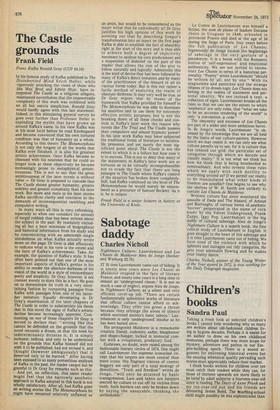The Castle grounds
Frank Field
Franz Kafka Ronald Gray (CUP £4.10) In his famous study of Kafka published in The Disinherited Mind Erich Heller, while vigorously attacking the views of those who like Max Brod and Edwin Muir, have interpreted The Castle as a religious allegory, maintained nevertheless that the impenetrable complexity of this work was combined with an all but sancta simplicitas. Ronald Gray would hardly agree with this last statement. Indeed, in this stimulating general survey he goes even further than Professor Heller in exploding the myths that have grown up around Kafka's name. In his view Kafka was at his most lucid before he read Kierkegaard and became convinced that his own tortured condition was that of humanity as a whole. According to this theory The Metamorphosis is not only the longest of all the works that Kafka ever finished, it is also his greatest artistic achievement. Once Kafka became so obsessed with his neuroses that he could no longer look at them objectively he became increasingly prone to metaphysical pretentiousness. This is not to say that the great ambitiousness of the later novels is without value — Dr Gray is prepared to concede that The Castle shows greater humanity, greater subtlety and greater complexity than his later work. But more and more in his later stories Kafka sacrifices clarity and concision to the demands of inconsequential rambling and
compulsive writing. •
In many ways all this is very refreshing, especially so when one considers the amount of turgid rubbish that has been written about the subject in the past. By resolutely excluding all but a bare minimum of biographical and historical information from his study and by concentrating with an admirable single mindedness on what Kafka actually wrote down on the page, Dr Gray is able effectively to indicate what in his view is the extent and the limit of Kafka's achievement. Take, for example, the question of Kafka's style. It has often been pointed out that one of the most important aspects of Kafka's genius is his ability to render the absolute darkness of his vision of the world in a style of extraordinary purity and simplicity. Dr Gray, however, is not content merely to state this as a fact. He goes on to demonstrate its truth in a very entertaining fashion by comparing passages from Kafka with passages from one of his latterday imitators. Equally devastating is Dr Gray's examination of the later chapters of The Castle in order to substantiate his thesis that in this novel the signs of Kafka's artistic decline become increasingly apparent. Commenting on one of these chapters Dr Gray is moved to declare that: "writing like this cannot be defended on the grounds that the novel recounts a dream, or that the need for indeterminancy dictates it. It is simply inchoate, tedious, and only to be understood on the grounds that Kafka himself did not wish it to be published, had not revised it, and thought (however ambiguously) that it deserved only to be burned." After having been exposed to so many portentious analyses of Kafka in the past, the reader cannot but be grateful to Dr Gray for remarks such as this.
And yet, on reflection, this same reader might feel that the narrowly aesthetic approach to Kafka adopted in this book is not wholly satisfactory. After all, had Kafka one on writing stories like The Metamorphosis he might have remained relatively unflawed as an artist, but would he be remembered as the major writer that he undoubtedly is? Dr Gray justifies his high opinion of this work by pointing out that by describing Gregor's transformation into an insect on the first page Kafka is able to establish the fact of absurdity right at the start of the story and is thus able to achieve both a degree of objectivity necessary to analyse his own predicament and a suspension of disbelief on the part of the reader that allows the rest of the plot to follow naturally and logically. Admittedly this is the kind of device that has been followed by many of Kafka's direct imitators and by many of the practitioners of the Absurd in all its various forms today. But is this not rather a facile method of exploring the realm of absolute darkness: It may very well be true, as Dr Gray argues, that by means of the framework that Kafka provided for himself in The Metamorphosis he was able to dominate his anxieties and to use them for extremely effective artistic purposes, but is not the breaking down of all these checks and controls in Kafka's later work the reason why novels like The Trial and The Castle possess their compulsive and almost hypnotic power? In his later work Kafka may have subjected the traditional forms of literature to intolerable pressures, and yet surely the most significant point about The Castle is not the extent to which it is a failure but how near it is to success. This is not to deny that many of the statements in Kafka's later work are so tortuous as to be virtually incomprehensible nor to evade the fact that there are long passages in The Castle where Kafka's control of the situation has broken down completely. Still, had Kafka continued on the level of The Metamorphosis he would merely be remembered as a precursor of Samuel Beckett. As it is, he is unique.
Frank Field is a senior lecturer in history at the University of Keele.


































 Previous page
Previous page